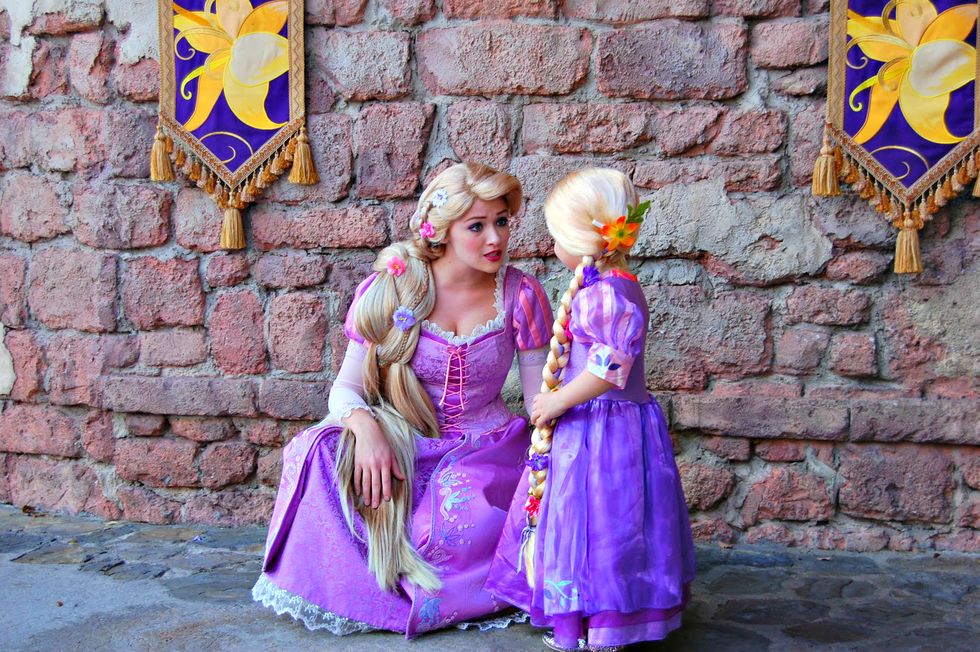Like most 22-year-old girls, I grew up on Disney movies. I owned all of them on VHS and would watch them repeatedly until they broke and my mom had to buy the same movie, again. I dressed up as Megara from "Hercules" on Halloween for almost five straight years.
Safe to say, I have had a small obsession.
Generally, when people ask me about my Disney obsession — it's meant with either enthusiastic understanding which is almost always followed by an extensive discussion on which Disney movie was the best or which Disney villain is the most terrible.
The answers are "Hercules" and Gaston respectively, if you were wondering.
The confused contemplation is almost always followed by, "Aren't you too old for Disney?" But the answer to that question is always "No. No, I am not."
So you can imagine my shock when instead of the normal of questions, my co-worker told me:
"Oh, I would never let my daughter watch those movies. The princesses are terrible."
After a moment of shock, in which I stared open-mouthed for a good minute, I found out that the reason these princesses were "terrible" was because my co-worker found them "not feminist enough."
With the exception of Tiana, Mulan and Pocahontas— Disney princesses were too focused on men to be good role models. This bothered me all week.
So, this is for all those other moms who don't see the real genius behind Disney.
First of all, I have nothing against Mulan, Tiana, or Pocahontas. All three are fantastic Disney princesses— they teach extremely important lessons about life and doing what makes you happy. But to only see those three as the pinnacle of Disney is to overlook all the fantastic heroines Disney has produced since "Snow White and the Seven Dwarfs" came out in 1938.
Now, I will not be able to defend every single Disney princess, but I am going to personally defend Cinderella and Rapunzel because these were the princesses that my co-worker had the most trouble with, and ironically, these are some of my favorite Disney movies.
The first argument I often hear associated with Cinderella is that she needs the prince to be happy.
Yet Cinderella never asked for a man, prince or otherwise. She asked for a nice dress and a night off. The fact that the prince fell in love with her was a happy accident. This inevitably brings up the "he only loved her because she was pretty!" argument that I hear over and over and over again— I have to call bullsh*t on this, too.
The prince is surrounded by beautiful women all night and he picks Cinderella. Not because she's the prettiest, but because she's kind and good and everything her stepsisters are not. He does not fall in love with her beauty, if he did he would have recognized her face at first glance, he falls in love with her, full stop.
The lesson in "Cinderella" isn't that you can only be happy when someone loves you, it's that if you are kind and good and have hope, in the end, everything will turn out alright.
Rapunzel, at least through the eyes of my co-worker, had a lot of the same problems. She needs a man to save her, she can't be happy without him — blah, blah, blah.
Just like Cinderella, Rapunzel actually doesn't wish for a man. She (and a bunch of roughens and thugs) sings a whole song about her hopes and dreams, and not once does she utter the line "I want to find love." Someone else does, but that's beside the point.
She wants to see the floating lanterns. Flynn Rider is a means to an end. She can't get to the city without him, but it's not because he's a man. Flynn Rider could have been a magical talking pig but unless he knew how to get to the lanterns, Rapunzel would still be lost in the forest. This same line of reasoning applies to the end of the film as well. I've seen people compare it time and time again with "Frozen."
I've heard the "Anna and Elsa didn't need a man" argument. But the whole point of "Tangled" is that Rapunzel didn't either. She saves Flynn Rider because she cares about him, not because she can't live without him.
Sure, she doesn't want to, but you can be a feminist and follow your dreams and still fall in love, can't you?
Sure, these movies aren't perfect, and the heroines aren't the best, but they aren't the worst either. I'm not saying that Disney is the ultimate feminist machine, but I am saying that if you solely focus on the love story if you just skim the surface of the movie, you're missing out.
Disney throws in fantastic lessons for young girls every day. One of them is that you can want a fancy dress and plan on a happy ending — and still be a feminist.



















